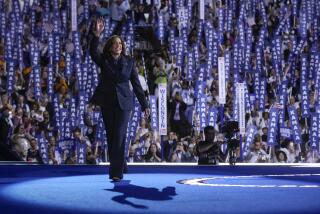The ‘unitary executive’ question
In answering Gwen Ifill’s question about vice presidential powers at last week’s debate, Joe Biden redirected attention to the still not very well known concept of the “unitary executive.”
Biden charged that Dick Cheney had become “the most dangerous vice president we’ve had probably in American history” because of his attempts to create a super-powerful unitary executive. Biden didn’t take time to explain exactly what he meant, but it’s an extremely important, poorly understood subject, and it’s time to question the presidential candidates -- closely -- about it.
Plenty of presidents have worked to increase presidential power over the years, but the theory of the unitary executive, first proposed under President Reagan, has been expanded since then by every president, Democrat and Republican alike. Reagan’s notion was that only a strong president would be able to dramatically limit big government. Perhaps drawing on a model for unitary corporate leadership in which the CEO also serves as chairman of the board, the so-called unitary executive promised undivided presidential control of the executive branch and its agencies, expanded unilateral powers and avowedly adversarial relations with Congress.
In the years that followed, Heritage Foundation and Federalist Society conservatives worked to provide a constitutional cover for this theory, producing thousands of pages in the 1990s claiming -- often erroneously and misleadingly -- that the framers themselves had intended this model for the office of the presidency.
Unitarians (for lack of a better word) want to expand the many existing uncheckable executive powers -- such as executive orders, decrees, memorandums, proclamations, national security directives and legislative signing statements -- that already allow presidents to enact a good deal of foreign and domestic policy without aid, interference or consent from Congress. Ardent proponents even insist that there are times when the president -- like a king -- should operate above the law.
Presidents and their supporters justify the unitary executive with an expansive reading of Article II of the Constitution (which sets out the role of the executive branch), invariably citing congressional log-jamming (what we used to call “checking and balancing”) or national security.
Each president since 1980 has used the theory to seize more and more power. Reagan used expanded unilateral powers to launch an era of deregulation. Presidents George H.W. Bush, Clinton and George W. Bush all used the legislative signing statement -- the written text they are allowed to give when signing a bill into law in order to explain their position -- not simply to offer warnings and legal interpretations but to make unilateral determinations about the validity of the provisions of particular statutes. The American Bar Assn. denounced this practice in 2006 as presenting “grave harm to the separation of powers doctrine, and the system of checks and balances, that have sustained our democracy for more than two centuries.”
One problem is that presidential unilateralism can seem reassuring in times of crisis, so it often receives congressional support. Most recently, in the name of managing our fiscal crisis, Congress has granted unprecedented powers to the executive and to an unelected and unaccountable secretary of the Treasury.
Another problem is that once Congress gives powers to the executive branch, it seldom can get them back. In 2001, Congress granted Bush the authorization to use military force against terrorists; five years later, when Congress sought to take back some of that authority by passing a bipartisan anti-torture bill, Bush was unwilling to back down. Instead, he signed the bill into law but appended a signing statement insisting that he would uphold the law in a manner consistent with “the constitutional authority of the president to supervise the unitary executive branch and as commander in chief.” In other words, he would ignore its provisions if he felt they limited his authority.
Bush’s aggressive exercise of unilateral powers has attracted serious opposition. Unfortunately, too many imagine that the unitary executive doctrine and its kingly prerogatives will leave office with him. That hope is false. History teaches that presidents do not give up power -- both Democrats and Republicans have worked to keep it. And besides, hoping the next president will give back some powers means conceding that it is up to him to make that decision.
If people have found Bush’s exercise of executive power alarming, they should not only begin questioning presidential candidates about it, they should make it clear to their congressional representatives that they want these excess powers checked. Barack Obama has already promised that he will continue using signing statements, though he will not act as if they have the force of law. Interestingly enough, John McCain has suggested he will end the practice. These slim indicators deserve more pressure and scrutiny.
Dana D. Nelson, a professor of American studies at Vanderbilt University, is the author of “Bad for Democracy: How the Presidency Undermines the Power of the People.”
More to Read
A cure for the common opinion
Get thought-provoking perspectives with our weekly newsletter.
You may occasionally receive promotional content from the Los Angeles Times.










